フェイト/ゼロ
Fate/Zero anime
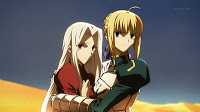 Having become a fan of the Fate/* franchise after watching Fate/stay night, I was pleased to hear that a prequel anime series would be based off of the 4-volume light novel series of the same name, entitled Fate/Zero. Although my viewing was based off of the TV version, which is edited for time and content from the DVD/BD version, I found the prequel to be better than expected.
Having become a fan of the Fate/* franchise after watching Fate/stay night, I was pleased to hear that a prequel anime series would be based off of the 4-volume light novel series of the same name, entitled Fate/Zero. Although my viewing was based off of the TV version, which is edited for time and content from the DVD/BD version, I found the prequel to be better than expected.
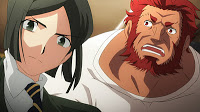 One of the problems Fate/stay night had as an anime is one that all anime adaptations of visual novels have. In a visual novel, there isn’t just a single ending. Discounting the “bad endings,” whereby your choices in the visual novel lead you to a negative story conclusion, there are multiple paths a visual novel reader can take which will lead to a successful conclusion of one kind or another. Unfortunately, many of these paths are not compatible, thus when attempting to put multiple paths into a single story, things don’t always work so well. That was FSN‘s problem when it came to story flow. With Fate/Zero, this issue is avoided since there is only one story from the visual novels.
One of the problems Fate/stay night had as an anime is one that all anime adaptations of visual novels have. In a visual novel, there isn’t just a single ending. Discounting the “bad endings,” whereby your choices in the visual novel lead you to a negative story conclusion, there are multiple paths a visual novel reader can take which will lead to a successful conclusion of one kind or another. Unfortunately, many of these paths are not compatible, thus when attempting to put multiple paths into a single story, things don’t always work so well. That was FSN‘s problem when it came to story flow. With Fate/Zero, this issue is avoided since there is only one story from the visual novels.
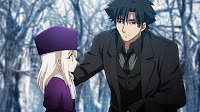 Another way Fate/Zero trumps Fate/stay night is by being a darker, more mature story. FSN fell into a typical harem aspect where the lead teen male is a nice guy suddenly thrust into a world he knew nothing about. However, he has a bevy of babes around him, all of whom are in love with him, and he manages to make it through, but has to choose a babe as well. Fate/Zero is an adult world where most of the people participating are well versed in this Grail War and aren’t saddled down with other issues like homework, going to school, or even choosing a babe to be your main squeeze during those hormone-filled days and nights.
Another way Fate/Zero trumps Fate/stay night is by being a darker, more mature story. FSN fell into a typical harem aspect where the lead teen male is a nice guy suddenly thrust into a world he knew nothing about. However, he has a bevy of babes around him, all of whom are in love with him, and he manages to make it through, but has to choose a babe as well. Fate/Zero is an adult world where most of the people participating are well versed in this Grail War and aren’t saddled down with other issues like homework, going to school, or even choosing a babe to be your main squeeze during those hormone-filled days and nights.
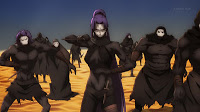 Fate/Zero is a character series, where the action is only the frosting on the cake. We have a collection of flawed characters who enter the Grail War, each with their own agendas. While the central focus of the series is on Kiritsugu, the man who would eventually adopt Shirou from Fate/stay night, I liked that the anime took time to look at the other characters, including the murderous psychopath Ryuunosuke. The series examines not only the Masters, but the Servants as well, all of whom are flawed in one way or another (though Assassin comes up on the short end of the stick, and isn’t examined at all to my memory). I found the character explorations to be very interesting.
Fate/Zero is a character series, where the action is only the frosting on the cake. We have a collection of flawed characters who enter the Grail War, each with their own agendas. While the central focus of the series is on Kiritsugu, the man who would eventually adopt Shirou from Fate/stay night, I liked that the anime took time to look at the other characters, including the murderous psychopath Ryuunosuke. The series examines not only the Masters, but the Servants as well, all of whom are flawed in one way or another (though Assassin comes up on the short end of the stick, and isn’t examined at all to my memory). I found the character explorations to be very interesting.
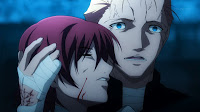 The TV series does suffer some from having to be edited for time and/or content. Granted, I didn’t need to see more of Ryuunosuke’s and Caster’s gory orgy of slaughtering children, but some edits for time meant that certain explanations or moments are left out. The result is that those who’ve not read the light novels can easily get confused at times, not clearly seeing how the TV version got from one point to another. These cuts also mean some fights are less than satisfying. It isn’t massive issue, and those watching the DVD/BD releases won’t experience this problem at all.
The TV series does suffer some from having to be edited for time and/or content. Granted, I didn’t need to see more of Ryuunosuke’s and Caster’s gory orgy of slaughtering children, but some edits for time meant that certain explanations or moments are left out. The result is that those who’ve not read the light novels can easily get confused at times, not clearly seeing how the TV version got from one point to another. These cuts also mean some fights are less than satisfying. It isn’t massive issue, and those watching the DVD/BD releases won’t experience this problem at all.
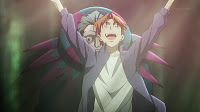 Someone asked about the melodrama factor for Fate/Zero. I will admit that the psycho, serial killer Ryuunosuke and his Servant, Caster, are the most melodramatic elements of the series. Obviously, a young male who gets off on killing kids, and someone brought back from history to fight a supernatural war for the Grail who enjoys tormenting kids before butchering them, is going to evoke powerful emotions, both of rage against the psychos, and pity for the poor children being slaughtered. However, this is only a small portion of the anime as a whole, and even then, Ryuunosuke’s twisted mind and Caster’s twisted mind and motivations are looked at.
Someone asked about the melodrama factor for Fate/Zero. I will admit that the psycho, serial killer Ryuunosuke and his Servant, Caster, are the most melodramatic elements of the series. Obviously, a young male who gets off on killing kids, and someone brought back from history to fight a supernatural war for the Grail who enjoys tormenting kids before butchering them, is going to evoke powerful emotions, both of rage against the psychos, and pity for the poor children being slaughtered. However, this is only a small portion of the anime as a whole, and even then, Ryuunosuke’s twisted mind and Caster’s twisted mind and motivations are looked at.
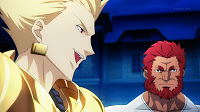 By the end of the series, I did have one other small problem, but I allow it to slide because of the other positives. The character of Archer is massively overpowered, and once it is shown just how powerful he is, one thinks, “Why didn’t Tokiomi simply have Archer mop up the floor with the others and just win it all?” Instead, Archer is so arrogant and lazy that the war lasts entirely way too long (after the final Servant was summoned, it should have been over 24-hours later). Not only that, but Tokiomi gets into a complicated scheme to try to make sure to win the war, which was fine initially, but once we see how powerful Archer is, it seems like a colossal waste.
By the end of the series, I did have one other small problem, but I allow it to slide because of the other positives. The character of Archer is massively overpowered, and once it is shown just how powerful he is, one thinks, “Why didn’t Tokiomi simply have Archer mop up the floor with the others and just win it all?” Instead, Archer is so arrogant and lazy that the war lasts entirely way too long (after the final Servant was summoned, it should have been over 24-hours later). Not only that, but Tokiomi gets into a complicated scheme to try to make sure to win the war, which was fine initially, but once we see how powerful Archer is, it seems like a colossal waste.
In the end, Fate/Zero is a series I found to be a compelling character drama with action on the side and a bit of melodrama thrown in as garnish. It is far superior to Fate/stay night as an anime and well worth taking a gander at.



 July 1st, 2012
July 1st, 2012  AstroNerdBoy
AstroNerdBoy 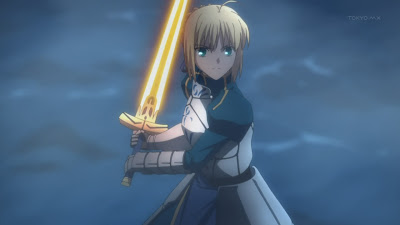
 Posted in
Posted in  Tags:
Tags: 
I think that Archer would use a lot of mana (or was it prana?) to kill all other Servants and Masters on his own. I know that Tokiomi is a very powerful dude and all, but I doubt that even he can supply that much energy to Archer.
Let me remind you that Rider could use his marble only three times.
With Archer, I think Tokiomi had trouble controlling him, and so had to work around his arrogance.
Now, this isn’t related to Fate/Zero, but are you still reviewing Fairy Tail? I don’t know any other way to contact you, so I’m asking here.
Tokiomi was simply too arrogant and confident. He had the referee and a skilled and loyal (or not) second Master/Servant and the strongest Servant on his side. That dramatically changed when Risei died, forcing him to act quickly and form alliances for a period of time, which again forced Kirei to act.
And of course there is another problem with Gilgamesh. Nasu’s statement is a bit ambiguous, but he said in a Q&A in CM3 that Gilgamesh cannot be controlled. Whether that actually includes Command Spells…? I doubt it. But 3 Command Spells would probably not be enough to force Gil to win the war and kill himself. Then again he had Risei, so cheating with Spells was actually possible.
And no, Gilgamesh’s mana costs are extremely low. He generally only needs mana for either charging Ea or opening Gate of Babylon, as far as I know. The weapons he shoots come back after a short time, so unlike FSN-Archer, he wouldn’t have to trace all the weapons and waste mana.
Other than that, I think the second half wasn’t done very well. Kiritsugu’s flashback was misplaced, dropping the tension and the changes or cuts of other scenes leave less emotional impacts. Gil’s flashback is missing or Kirei’s one, when he finds his dead father for example. Also, the rushing of the scenes by merging them is also a bit weird.
Overall I think they needed maybe two more episodes, then they would have 14 episodes for the first and 14 episodes for the second half. But well, I cannot completely judge FZ without having seen the BD release. The adaptation is definitely better than the FSN anime and it’s more faithful to the original source. I would have enjoyed the series more with less CG and distance shots, but I guess the budget was not enough for that.
P.S. @evgenidb: Please… do not use the word “prana”. That is a pseudo-term the writers of the TM wiki use because they cannot find a proper substitute for maryoku. The reason why they in general didn’t use mana is because Nasu differs between two sorts of maryoku: Od(o) and Mana, though they are essentially the same.
The correct translation is magical energy, that’s why some translators just use mana because it’s linguistically equivalent to magical energy and because magical energy is less commonly used, it’s for many people too long and pedantic. Raze from UTW for example translates Od as internal and Mana as external mana.
OK. I just forgot how that “magical energy” was called “mana”, “prana” or otherwise. And I didn’t want to download the whole series and search them until I find the correct term.
Otherwise, I think I never visited TM wiki or read the novels (the later I definitely have never done).
P.S. After your comment I checked wiki (the normal one). Od, Chi, Prana – basically means the same thing but in different languages. Well, they might have different details (I haven’t read the whole articles there!), but all of them mean “life energy”. Od (or Odic force) was coined by Baron Carl von Reichenbach in the middle of 19th century. Chi and Prana are from Chinese and Indian religion. And they also mean “life energy”. So it appears “prana” wasn’t completely off. And if this isn’t pure luck and coincidence! 😉
Prana might be an Indian term, but it is not a proper translation. It’s just a substitute that they camne up with because they cannot find a short translation. That’s what I mean. No one really translates maryoku as chi.
Prana was also used by the Nico Nico translators and that really pissed me off to be honest, the same goes to the translation of Saber’s name Arturia. It’s just completely wrong, at least in this universe. Nasu chose Od and Mana and Maryoku, so you can basically go along with that. That was not meant to offend you, I just wanted to make the terms clear. 🙂
Thanks for the info. ^_^
“That was not meant to offend you, I just wanted to make the terms clear. :)”
Trust me, nothing from your posts offended me. And as ANB wrote: “Thanks for the info. ^_^”.
Speaking of the Fate/Stay Night visual novel, are you aware of Unlimited Blade Works? It’s a movie that’s dedicated to one of the other paths of the visual novel of the same name. After Fate/Zero, I hear that Type-Moon will also be making an OVA series to cover the third Fate/Stay Night path. If you haven’t seen Unlimited Blade Works, I recommend it, as you can complete it easily in one sitting. Also, Shirou isn’t anywhere near as useless as he is in Fate/Stay Night XD
I don’t recommend it, at least not until he has read the actual route. The movie basically skips the whole story and only shows the fights, which look in general really cool, but Fate isn’t just about the fights if you ask me.
There is absolutely no character development and it doesn’t matter whether you’re watching it after reading the novel or not, either way you’ll notice that something is definitely missing. And it’s important.
I still have yet to do the visual novel. It is one of those things I want to do, but it is one of those things I never quite seem to find time to do. 🙁 I have to try, I guess. I do have the movie, though I’ve yet to watch it.
I think the main reason why they skipped the character development is because they did most of that in Fate/Stay Night. Knowing that their target audience were people already familiar with the franchise, I think they were afraid of being repetitive. I haven’t done the Unlimited Blade Works route, just Fate, so I really don’t know if there’s anything else missing besides the character development, which didn’t bother me since I already knew the characters.
Also, if you’re familiar with other Type-Moon series’, I recommend Carnival Phantasm. It’s a series that very blatantly parodies their other shows. Just finished watching it all myself, laughed at just about every episode.
I hope you are kidding… but I’m afraid since you didn’t read UBW you are not.
Shirou’s development is different. Rin’s is different. Heck, most Servants act differently. There are as many repetitions as there are fans who say Tsukihime got a good anime adaptation. (And I am assuming there are few.)
That is the most interesting fact of all three routes. Just a few different decisions and you get a new story with the same settings. You can’t really tell me you know Archer without having seen UBW as much as someone tells me he knows Rider after having seen her in Fate up to the point in which she was blown into nothingness after an Excaliblast.
The movie is good to those who know the plot and wanted to see the fights animated. Otherwise, everyone else is missing a lot of important stuff. And story – that is imo Nasu’s strongest feature. Fate is the setup and at best shows 20-25% of FSN’s story.
And if you’re recommending CP to me, I’ve already watched all episodes half a year ago, including Fate/Prototype. Fortunately, since I am well aware of F/HA, FSN, Tsukihime, MB and co. I understood most of the parodies so it is as you’ve said only recommendable to those who know the Nasuverse. It was just a short cameo, but seeing V/V was a pleasant surprise.
Right now, I’m more interested in Kaleid Prisma Illya, since that will be the next Type-Moon series that gets an anime. Perhaps Girls’ Work from ufotable will follow or HF. Who knows…
really want to see the anime adaptation of the realta nua ending for f/sn the fate route. if they were not going to do the faithful version of the novel .. they should have at least added that ending to satisfy those who sat through that weird anime
[…] anime series to the Fate/stay night series, are doing a new Fate/stay night anime series. I loved what ufotable did with Fate/Zero, which I understand was a pretty faithful adaptation to the […]